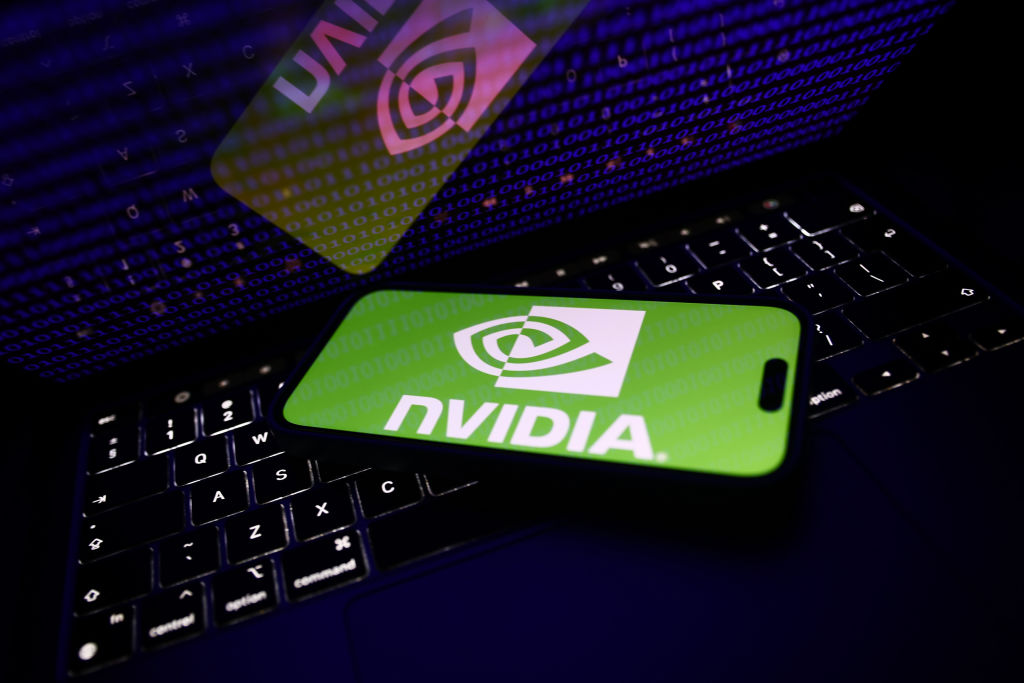Nvidia shares plummet almost 10% – what does it mean for investors?
Nvidia shares sank almost 10% yesterday, driven by weak economic data in the US and reports that the US Department of Justice is ramping up its antitrust investigation


Get the latest financial news, insights and expert analysis from our award-winning MoneyWeek team, to help you understand what really matters when it comes to your finances.
You are now subscribed
Your newsletter sign-up was successful
Want to add more newsletters?

Twice daily
MoneyWeek
Get the latest financial news, insights and expert analysis from our award-winning MoneyWeek team, to help you understand what really matters when it comes to your finances.

Four times a week
Look After My Bills
Sign up to our free money-saving newsletter, filled with the latest news and expert advice to help you find the best tips and deals for managing your bills. Start saving today!
Chipmaker giant Nvidia saw its shares slump by almost 10% yesterday (3 September) as part of a broader sell-off in US equity markets.
This was prompted by weaker-than-expected manufacturing data in the US, which stoked fears about the health of the US economy. The Federal Reserve has been holding interest rates at a 23-year high of 5.25-5.5% for over a year – and there are signs that it is starting to pinch.
The sell-off also coincided with reports that the US Department of Justice has issued Nvidia with a subpoena, ramping up the antitrust investigation that began in June. US officials are understood to be looking into whether the company is making it too difficult for customers to switch away from its chips, potentially violating competition laws.
MoneyWeek
Subscribe to MoneyWeek today and get your first six magazine issues absolutely FREE

Sign up to Money Morning
Don't miss the latest investment and personal finances news, market analysis, plus money-saving tips with our free twice-daily newsletter
Don't miss the latest investment and personal finances news, market analysis, plus money-saving tips with our free twice-daily newsletter
This continues what has already been a tough couple of months for the stock. Nvidia’s share price plunged 25% in the second half of July and first week of August, as a sell-off in the tech sector was followed by a rout in global equity markets.
The stock had recovered most of this ground by the end of August, but underwhelming second-quarter results sent some investors running for the hills once again. Despite beating expectations, the company’s revenues grew at a slower rate than in previous quarters.
Despite this, the stock is still up 7.5% over the past month and 124% year-on-year. It also remains popular with retail investors, with UK platform Interactive Investor reporting that it topped the league table as its most bought stock in August.
Should investors be concerned about Nvidia?
“While it’s always alarming to see share prices flash red, it’s perfectly normal to see further market pullbacks after you get the type of wobble seen over the summer,” says Russ Mould, investment director at AJ Bell.
Investors will now be watching closely for further signs of how the US economy is holding up, as a downturn could spell bad news for business in general. The labour market is in focus this week, with jobs data for August due on Friday. Markets will be hoping that it looks stronger than it did last month, when hiring fell sharply and the unemployment rate ticked up.
The Federal Reserve will also meet later this month and chairman Jay Powell has indicated a cut could be on the cards. As rates come down, it should start to ease the pressure on consumers and businesses, hopefully giving a boost to markets in the process.
While the latest manufacturing data explains the blip in US equity markets yesterday, investors might be concerned about the fact that Nvidia experienced a far sharper downturn than the S&P 500, which fell by 2%. Part of the reason for this is that markets are starting to question whether AI stocks are overvalued.
“Concerns are growing that the much-hyped benefits of artificial intelligence powered products and services aren’t yet showing up in a big enough way to justify the huge sums being poured into the technology,” says Susannah Streeter, head of money and markets at Hargreaves Lansdown.
“A sharper downturn for the mighty US economy may lead to more firms battening down the hatches and rethinking their capital expenditure plans in support of AI,” she adds. “This is causing a rethink about the scale of future revenue streams, knocking valuations.”
Going forward, Nvidia has said it expects its revenues to hit $32.5 billion next quarter, plus or minus 2%. This would amount to a growth rate of 79% year-on-year. The company has a good track record when it comes to beating forecasts, but investors are setting the bar increasingly high as they become jittery about the outlook for AI stocks. The risk is that this creates a big margin for disappointment.
Get the latest financial news, insights and expert analysis from our award-winning MoneyWeek team, to help you understand what really matters when it comes to your finances.
Katie has a background in investment writing and is interested in everything to do with personal finance, politics, and investing. She previously worked at MoneyWeek and Invesco.
-
 How to navigate the inheritance tax paperwork maze in nine clear steps
How to navigate the inheritance tax paperwork maze in nine clear stepsFamilies who cope best with inheritance tax (IHT) paperwork are those who plan ahead, say experts. We look at all documents you need to gather, regardless of whether you have an IHT bill to pay.
-
 Should you get financial advice when organising care for an elderly relative?
Should you get financial advice when organising care for an elderly relative?A tiny proportion of over 45s get help planning elderly relatives’ care – but is financial advice worth the cost?
